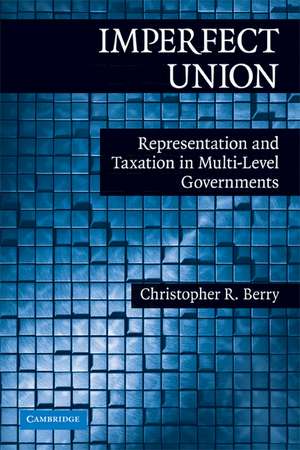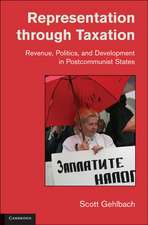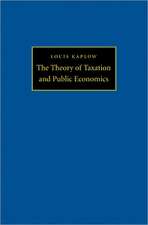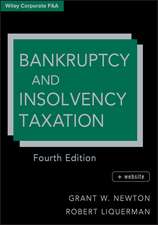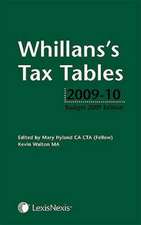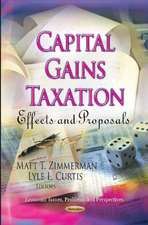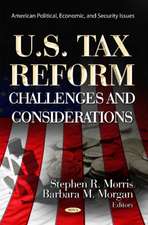Imperfect Union: Representation and Taxation in Multilevel Governments: Political Economy of Institutions and Decisions
Autor Christopher R. Berryen Limba Engleză Paperback – 13 sep 2009
| Toate formatele și edițiile | Preț | Express |
|---|---|---|
| Paperback (1) | 228.60 lei 6-8 săpt. | |
| Cambridge University Press – 13 sep 2009 | 228.60 lei 6-8 săpt. | |
| Hardback (1) | 552.94 lei 6-8 săpt. | |
| Cambridge University Press – 13 sep 2009 | 552.94 lei 6-8 săpt. |
Din seria Political Economy of Institutions and Decisions
-
 Preț: 133.60 lei
Preț: 133.60 lei -
 Preț: 306.68 lei
Preț: 306.68 lei -
 Preț: 235.99 lei
Preț: 235.99 lei -
 Preț: 200.87 lei
Preț: 200.87 lei -
 Preț: 211.85 lei
Preț: 211.85 lei -
 Preț: 231.82 lei
Preț: 231.82 lei -
 Preț: 295.55 lei
Preț: 295.55 lei -
 Preț: 208.16 lei
Preț: 208.16 lei -
 Preț: 177.53 lei
Preț: 177.53 lei -
 Preț: 226.25 lei
Preț: 226.25 lei -
 Preț: 236.43 lei
Preț: 236.43 lei -
 Preț: 265.11 lei
Preț: 265.11 lei -
 Preț: 228.38 lei
Preț: 228.38 lei -
 Preț: 281.49 lei
Preț: 281.49 lei -
 Preț: 285.37 lei
Preț: 285.37 lei -
 Preț: 279.98 lei
Preț: 279.98 lei - 14%
 Preț: 773.75 lei
Preț: 773.75 lei -
 Preț: 233.38 lei
Preț: 233.38 lei -
 Preț: 247.41 lei
Preț: 247.41 lei -
 Preț: 203.12 lei
Preț: 203.12 lei -
 Preț: 230.33 lei
Preț: 230.33 lei -
 Preț: 286.69 lei
Preț: 286.69 lei - 14%
 Preț: 790.57 lei
Preț: 790.57 lei -
 Preț: 265.32 lei
Preț: 265.32 lei - 11%
 Preț: 554.15 lei
Preț: 554.15 lei -
 Preț: 287.07 lei
Preț: 287.07 lei - 11%
 Preț: 700.20 lei
Preț: 700.20 lei -
 Preț: 273.13 lei
Preț: 273.13 lei -
 Preț: 459.84 lei
Preț: 459.84 lei -
 Preț: 280.35 lei
Preț: 280.35 lei -
 Preț: 260.11 lei
Preț: 260.11 lei - 11%
 Preț: 640.30 lei
Preț: 640.30 lei -
 Preț: 286.89 lei
Preț: 286.89 lei -
 Preț: 247.80 lei
Preț: 247.80 lei - 11%
 Preț: 691.81 lei
Preț: 691.81 lei -
 Preț: 287.48 lei
Preț: 287.48 lei - 11%
 Preț: 641.80 lei
Preț: 641.80 lei - 11%
 Preț: 635.32 lei
Preț: 635.32 lei -
 Preț: 271.01 lei
Preț: 271.01 lei -
 Preț: 265.70 lei
Preț: 265.70 lei
Preț: 228.60 lei
Nou
Puncte Express: 343
Preț estimativ în valută:
43.76€ • 47.55$ • 36.78£
43.76€ • 47.55$ • 36.78£
Carte tipărită la comandă
Livrare economică 22 aprilie-06 mai
Preluare comenzi: 021 569.72.76
Specificații
ISBN-13: 9780521758352
ISBN-10: 0521758351
Pagini: 274
Ilustrații: 17 b/w illus. 8 tables
Dimensiuni: 152 x 229 x 16 mm
Greutate: 0.36 kg
Ediția:New.
Editura: Cambridge University Press
Colecția Cambridge University Press
Seria Political Economy of Institutions and Decisions
Locul publicării:New York, United States
ISBN-10: 0521758351
Pagini: 274
Ilustrații: 17 b/w illus. 8 tables
Dimensiuni: 152 x 229 x 16 mm
Greutate: 0.36 kg
Ediția:New.
Editura: Cambridge University Press
Colecția Cambridge University Press
Seria Political Economy of Institutions and Decisions
Locul publicării:New York, United States
Cuprins
1. Introduction: into the fiscal common fund; 2. What's special about special-purpose governments?; 3. A political theory of special-purpose government; 4. Piling on: the problem of concurrent taxation; 5. Specializing and quality; 6. Governing the fiscal commons; 7. Conclusion.
Recenzii
'In Imperfect Union, Christopher R. Berry forcefully and adeptly argues that the Tiebout model of efficiently competing local government no longer comports with the structure of local political institutions. He demonstrates how the vertical overlap of local governments creates a common pool resource problem wherein governments vie for pieces of the tax base. Berry's work raises important questions about whether voters can navigate and control the complex jumble of special-purpose governments that affect almost every aspect of their lives. This book should make political scientists and economists reconsider the assumptions that have served as the basis for much of the research on local government finance for nearly half a century and should be required reading in any course on local government, fiscal policy, and modern democracy.' Mathew D. McCubbins, University of California, San Diego
'The United States has literally thousands of single-purpose governments, often layered on top of one another and sharing a common tax base. And many scholars believe that the proliferation of these entities is good for democracy. But Chris Berry, in the first detailed study of this layering phenomenon, shows that quite the opposite is true – that citizens don't participate, that interest groups prevail, that spending is too high, that outcomes are unrepresentative. This is a seminal work, rooted in theory and filled with interesting data, that advances our understanding of government and democracy.' Terry Moe, Stanford University
'As an economic downturn knocks local budgets out of kilter, the age-old questions asked by Christopher Berry are especially timely. Are local governments doing their job efficiently? If not, why not? What can be done to make the system work better? Combining powerful theory with sophisticated analyses of piles of information, Berry forgoes the descriptive and anecdotal to answer such questions definitively. Berry's disciplined, path-breaking work reaches theoretical heights comparable to the ones achieved by his great University of Chicago predecessors, Robert Parks, Louis Wirth, Edward Banfield, and James Q. Wilson.' Paul Peterson, Harvard University
'Well written, persuasively argued, and nicely packaged, Chris Berry's Imperfect Union invigorates the study of local institutions. By embedding the political structure of cities, counties, and special districts in a familiar political economy framework, Berry demonstrates how local institutions are special instances of institutions more generally. And doing so allows him to clarify the fiscal interrelationships among multiple layers of government in a theoretically compelling manner. This is a terrific accomplishment.' Kenneth A. Shepsle, Harvard University
'With this important and timely book, Berry fills a large hole in the literature on the political economy of local government in the United States, which for too long has ignored the rapid expansion of specialized, overlapping jurisdictions with concurrent tax powers. The book assembles an impressive array of data to document the causes and consequences of this trend, and more importantly, it makes a strong case that should attract attention beyond academia: special districts are bad for taxpayers and bad for democracy.' Jonathan Rodden, Stanford University
'Imperfect Union draws our attention to an understudied but deeply important aspect of American federalism. Berry demonstrates that, absent strong parties or other mechanisms of control, the overlapping nature of special-purpose governments can lead to severe overspending and inefficiency. Berry's first-rate scholarship makes this accessible work essential reading for scholars of federalism, urban governance, public finance, and party politics.' Craig Volden, The Ohio State University
'The United States has literally thousands of single-purpose governments, often layered on top of one another and sharing a common tax base. And many scholars believe that the proliferation of these entities is good for democracy. But Chris Berry, in the first detailed study of this layering phenomenon, shows that quite the opposite is true – that citizens don't participate, that interest groups prevail, that spending is too high, that outcomes are unrepresentative. This is a seminal work, rooted in theory and filled with interesting data, that advances our understanding of government and democracy.' Terry Moe, Stanford University
'As an economic downturn knocks local budgets out of kilter, the age-old questions asked by Christopher Berry are especially timely. Are local governments doing their job efficiently? If not, why not? What can be done to make the system work better? Combining powerful theory with sophisticated analyses of piles of information, Berry forgoes the descriptive and anecdotal to answer such questions definitively. Berry's disciplined, path-breaking work reaches theoretical heights comparable to the ones achieved by his great University of Chicago predecessors, Robert Parks, Louis Wirth, Edward Banfield, and James Q. Wilson.' Paul Peterson, Harvard University
'Well written, persuasively argued, and nicely packaged, Chris Berry's Imperfect Union invigorates the study of local institutions. By embedding the political structure of cities, counties, and special districts in a familiar political economy framework, Berry demonstrates how local institutions are special instances of institutions more generally. And doing so allows him to clarify the fiscal interrelationships among multiple layers of government in a theoretically compelling manner. This is a terrific accomplishment.' Kenneth A. Shepsle, Harvard University
'With this important and timely book, Berry fills a large hole in the literature on the political economy of local government in the United States, which for too long has ignored the rapid expansion of specialized, overlapping jurisdictions with concurrent tax powers. The book assembles an impressive array of data to document the causes and consequences of this trend, and more importantly, it makes a strong case that should attract attention beyond academia: special districts are bad for taxpayers and bad for democracy.' Jonathan Rodden, Stanford University
'Imperfect Union draws our attention to an understudied but deeply important aspect of American federalism. Berry demonstrates that, absent strong parties or other mechanisms of control, the overlapping nature of special-purpose governments can lead to severe overspending and inefficiency. Berry's first-rate scholarship makes this accessible work essential reading for scholars of federalism, urban governance, public finance, and party politics.' Craig Volden, The Ohio State University
Notă biografică
Descriere
This book offers the first political analysis of special purpose jurisdictions.
